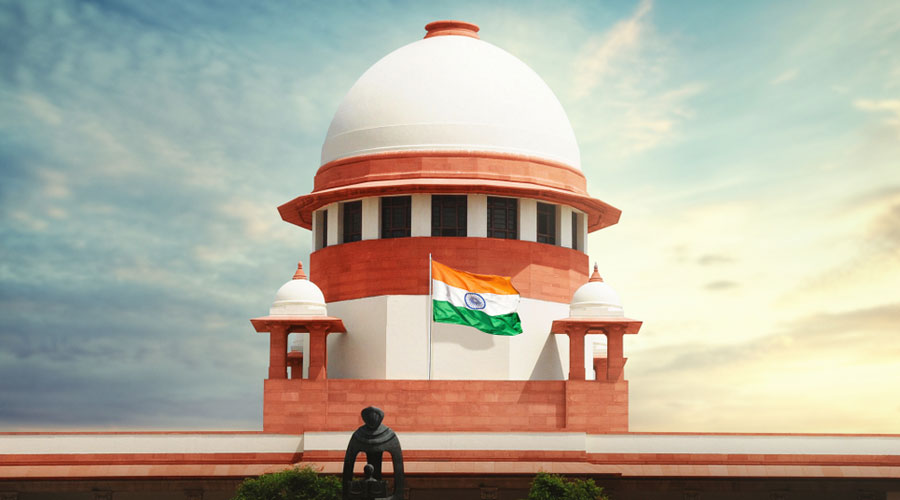The Supreme Court on Friday ruled that states must furnish quantifiable data to justify reservation in job promotions for Scheduled Castes and Scheduled Tribes.
The court laid down that data should be collected for each cadre individually, not for the entire services or the total state-wise population of the two socially backward categories.
“The state should justify reservation in promotions with respect to the cadre to which promotion is made. Taking into account the data pertaining to a ‘group’, which would be an amalgamation of certain cadres in a service, would not give the correct picture of the inadequacy of representation of SCs and STs in the cadre in relation to which reservation in promotions is sought to be made. Rosters are prepared cadre-wise and not group-wise,” the apex court said.
“For the purpose of collection of quantifiable data to assess representation of SCs and STs for… providing reservation in promotions, cadre, which is a part of a ‘group’, is the unit and the data has to be collected with respect to each cadre,” the judgment added.
A three-judge bench of Justices L. Nageswara Rao, Sanjiv Khanna and B.R. Gavai passed the verdict while disposing of a batch of petitions challenging the quotas set by different states in promotions for SC and STs without collecting proper data.
While upholding the validity of Article 16(4-A) relating to reservations in promotions for SCs and STs in public employment, the apex court had in the M. Nagaraj and others versus the Union of India case observed on October 19, 2006, that reservation in promotions in public services can be made subject to collection of quantifiable data by the state showing backwardness of the class and inadequacy of representation of that group in public employment, in addition to compliance with Article 335 of the Constitution.
Article 335 relates to claims of SCs and STs in matters of appointments to services in central and state governments.
The Supreme Court on Friday disagreed with the view of the Union government, articulated by attorney-general K.K. Venugopal, that the overall population of the SC and STs in a state should be considered for providing reservation in promotions.
“Before providing for reservation in promotions to a cadre, the state is obligated to collect quantifiable data regarding inadequacy of representation of SCs and STs. Collection of information regarding inadequacy of representation of SCs and STs cannot be with reference to the entire service or ‘class’/ ‘group’ but it should be relatable to the grade/ category of posts to which promotion is sought,” the court said.
“Cadre, which should be the unit for the purpose of collection of quantifiable data in relation to the promotional post(s), would be meaningless if data pertaining to representation of SCs and STs is with reference to the entire service.
“It is for the state to assess the inadequacy of representation of SCs and STs in promotional posts, by taking into account relevant factors,” Justice Rao, who authored the judgment, said.
The top court, however, refused to pass any order on the plea of some of the petitioners that there should be a periodical review of quota benefits available to SCs and STs in promotions.
“We are not inclined to express any view on discontinuation of reservations in totality, which is completely within the domain of the legislature and the executive. As regards review, we are of the opinion that data collected to determine inadequacy of representation for the purpose of providing reservation in promotions need to be reviewed periodically.
The period for review should be reasonable and is left to the government to set out,” Justice Rao said.
The court reiterated the reasoning in the Nagraj case that the discretion of the state to provide reservation is subject to the existence of backwardness and inadequacy of representation in public employment. It had further been held that backwardness is to be based on objective factors whereas inadequacy has to factually exist.
“This court was of the further opinion that the concepts of efficiency, backwardness, inadequacy of representation are required to be identified and measured on the basis of data. In case of a challenge made to reservations provided by the state government, it is incumbent on the state government to satisfy the court that the decision is supported by quantifiable data showing backwardness of the class and inadequacy of representation of that class in public employment, in addition to compliance with Article 335 of the Constitution of India,” the bench said on Friday.
“Determination of inadequate representation of SCs and STs in services under a state is left to the discretion of the state, as the determination depends upon myriad factors which this court cannot envisage,” it added.
The court said the 2006 judgment had made it clear that the validity of laws brought in by state governments providing reservation in promotions shall be decided on a case-to-case basis for the purpose of establishing whether the inadequacy of representation is supported by quantifiable data.
“Therefore, we are of the opinion that no yardstick can be laid down by this court for determining the adequacy of representation of SCs and STs in promotional posts for the purpose of providing reservation,” the bench said on Friday.
“The appropriate government has to apply cadre strength as a unit in the operation of the roster in order to ascertain whether a given class/ group is adequately represented in the service. Cadre strength as a unit also ensures that the upper ceiling limit of 50 per cent is not violated.
“It is open to the state to provide for reservation in promotions subject to limitation that there must exist compelling reasons for backwardness, inadequacy of representation in a class of post(s) keeping in mind the overall administrative efficiency,” the bench added.










